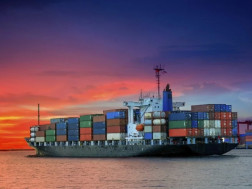PMC Research Centre published a report on Maritime Trade In The Black Sea In The Context Of The Russo-Ukrainian War. As of the report, the Black Sea region’s share in international maritime trade is only just 2.5%, while the North Sea region accounts for 17%. And despite there being huge potential in the enhancement of port infrastructure and connectivity in the Black Sea region countries, the varying and distinctive geopolitical orientations of these countries largely hinder any significant advancement in regional cooperation. The problem became even more severe with the latest military conflict in the region - the Russian invasion of Ukraine in February 2022.
According to the document, the war had major implications on the ports and trade in the Black Sea region. The most negatively impacted was Ukraine, through the devastating effects on its port infrastructure. In turn, this had a negative effect on global grain and food prices. In case of Russia, who was heavily sanctioned by the West, the arrivals in Black Sea ports declined in the first month of the war, and picked up to initial numbers soon, while the war didn’t have any significant implications for Turkey. In case of Romania and Bulgaria, as well as Georgia, trade and the amount of cargo transported have increased significantly, as a major part of trade from Ukraine, and a smaller part of the trade via Russia, was redirected to these countries.
“Before discussing maritime trade in the Black Sea region, it is important to emphasize the COVID-19 pandemic and its impact on global shipping and maritime mobility. The pandemic resulted in supply chain disruptions, which caused huge delays in the maritime trade of goods. The extended lockdowns created pent-up demand which further overwhelmed the capacity of supply chains. As a result, since autumn 2020, the shipping prices have surged strongly and reached the peak in early 2022. Despite the fact that prices have fallen since mid-2022, future shipping costs are expected to be higher and more volatile than in the past due to an operating environment that is becoming more unpredictable.
In this context, the problems in Black Sea ports concerning infrastructure and connectivity quickly became apparent during the pandemic. The supply chain disruptions, delays and rising prices were still present when the Russo-Ukrainian War broke out, which has even further exacerbated the disruptions caused by the pandemic. On the other hand, the shock of the pandemic underscored just how crucial maritime container trade is to the global economy. It also disrupted maritime trade routes and illustrated for companies the vulnerability of basing all operations in one location, exposing the liabilities of the existing maritime trade system.19 Accordingly, the Black Sea region has been given an opportunity to take advantage of this transformational shift and play an important role in offering businesses an alternative. During the pandemic, the necessity for the Black Sea ports to have additional capacities became sorely apparent.
As for the war, it’s effect on vessels’ activity in the Black Sea is clearly displayed in the number of port calls of dry bulk20 in the region in January-April 2022. The number of port calls made in Ukraine started decreasing a week before the war started, as precautions were increasingly being taken. Throughout the two months immediately after the outbreak of war, there was not a single arrival at a port in Ukraine, but the situation improved slightly in late April. Though the initial shock was significant, in Russia, arrivals surpassed the pre-war level in a month. Meanwhile, the number of port calls in the Black Sea two weeks after the war decreased by 136, while the same decrease for Ukraine and Russia combined was 29% lower. Hence, unsurprisingly, the war negatively affected the maritime industry of not only the countries engaged but the whole Black Sea region”, - the report reads.























